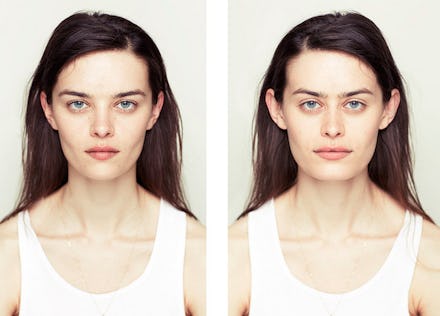The Science Behind Why You Look Weird In Your Selfies

The selfie is now an elevated art form, one that takes intricate thought and planning. Should you go the comedy route and post intentionally grotesque pics like #sellofies? Or do you want to go the extra mile and Photoshop yourself into oblivion? The selfie craze has taken over everyone from Oscar-nominated actors to the president of the United States, and there's a good reason why you might obsess over it: It's in your head.
Sometimes you're feeling at the top of your hair game and want to snap a picture. But the moment you take a look, you're taken aback and confused: Is that what you really look like? Well, that all has to do with the psychology of perception. We're used to seeing our reflection in the mirror, and our brains have trained us to recognize that image. But some photo apps flip that image and show your face the way others see it — and that can be disorienting.
Not buying it? Let's take a look at this well-known picture of Abraham Lincoln.
Image Credit: Radiolab
Now, let's flip that image horizontally.
Image Credit: Radiolab
While Lincoln appears to be the same person, there is something that feels ... off. We've all been used to seeing Lincoln's face in a certain manner, and the flipped image looks like the former president's twin or alternate universe version.
"We see ourselves in the mirror all the time — you brush your teeth, you shave, you put on makeup," Pamela Rutledge, director of the Media Psychology Center, told the Atlantic. "Looking at yourself in the mirror becomes a firm impression. You have that familiarity. Familiarity breeds liking. You've established a preference for that look of your face."
The strangeness of seeing your face flipped also comes from the fact that our faces are not perfectly symmetrical. In fact, if you take two halves of your face and replicate them, you can end up with very different versions:
Image Credit: Buzzfeed/Alex John Beck
Image Credit: Buzzfeed/Alex John Beck
The close-range lenses on our camera phones can also drastically change your appearance based on distance. If you either sit close to a zoomed-out camera or stand far from a zoomed-in camera, the size of your head should be the same in both pictures — but your features can look very different:
Image Credit: Wordpress/Daniel Baker
While excessive selfie use has been linked by some to body image issues and dysmorphia, these pictures can also help you feel more comfortable in your own skin. If you experiment with how you and others perceive your face, you can control how you look. Whether you're into selfies or not, it's your face — own it any way you want to.